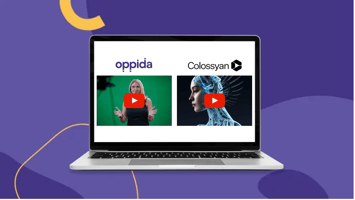The Colossyan Creator team in the UK recently reached out to Oppida to showcase their DIY AI video...
About Oppida and online education
Oppida and online education... I have always been an educator. It’s in my blood. However, over the last few years, I have felt something missing from my life. I realised it was my burning desire to educate and empower but I was feeling a deep sense of helplessness by the environment in which I was working. Oppida was born out of the realisation that, to some extent, I believe we have collectively forgotten to approach online education and the scary ‘future of work’ with an educator’s mindset.

What is an educator’s mindset?
The Oxford English Dictionary defines the term educate as:
“Give intellectual, moral, and social instruction to (someone), typically at a school or university.”
Well, this just doesn’t feel right in 2019… We know it is so much more complex than that and the way individuals and organisations are educating themselves goes far beyond school or university. On its own, this definition also implies that it is a one-way exchange; I ‘give’ knowledge and you ‘receive’ it.
However, the word educate originates from the Latin word educat which means to ‘bring up or rear’ and from the verb educare which is related to educere ‘lead out’ (or educe).
The same Oxford English Dictionary defines educe as:
‘Bring out or develop (something latent or potential)’
Now that is a far better definition for what quality education is about. No one is a blank slate and everyone has unique passions, skills, knowledge, perspectives, and infinite potential. True educators dont ‘give’ information—they scaffold, lead, support, and ‘bring out’ the best in others and provide space for potential to be met.
Oppida exists to do just that, through online education, for everyone we come in contact with. This is because I believe that, collectively, educators and institutions from all sectors have a lot of learning to do. I also believe that for far too long we have had a disconnect and skills gap between decision-makers, educators, and learners. On top of all that, we have a moral imperative to educate our current and future generations in a way that enables them to lead successful and fulfilling lives (not to mention preparing them to help solve the wicked problems we face across the globe).
Educators have a lot of learning to do for online education
We are in the 4th Industrial Revolution—there is no doubt in my mind. The rapid technological growth we have seen in the last 20-30 years has changed the way we live, work, socialise, engage, and, of course, learn. Online education and the ‘future of work’ are already here and our young people are true global citizens. This change has been rapid and it is easy to see why many people, organisations, and sectors have shown resistance. The attitude of ‘if I just ignore it then maybe it will go away’, worked for a little while but I believe it won't anymore. Educators play such an important role in shaping society at all levels. I believe collectively if we collaborate and support one another we raise the bar together. We can grow our own capabilities and lead into the future with confidence.
Disconnect and skills gap
Throughout my 12 years working in and around the education sector I have witnessed:
- Countless unrealistic development deadlines and budgets being set
- Highly stressed online education teams
- An underutilisation of technology
- ‘Mediocracy’ has become the gold standard for online learning
- Learners be forgotten
- The role of an educator be completely undervalued in the design process.
Fundamentally I think this is due to the pressure, panic, and insecurity that people are feeling in society, their jobs, and for the future. Everything has to be done yesterday and this is creating a fragmented and frankly stressed-out sector. So, by adopting an educator’s mindset I say. ‘It’s ok. We are in this together and you are not supposed to know everything now. Let’s get back to basics and work within the environment you have to get the best possible outcome’.
A societal and moral imperative
Education has to scale. It doesn’t have a choice. In six years time, we will have 350 million more secondary students and 150 million more post-secondary students to educate globally. These cannot all be in a classroom with a 1:30 ratio of ‘learning’ between 8:30 am and 3:15 pm for 200 days of the year. If we don’t work out a way to scale quality education (through online education) then we risk more inequality than we currently already see. We need our current and future generations to be experts in online education, critical thinking, problem-solving, and digital technologies (just to name a few). (Holoniq.com, 2019)
In addition, there is the rising middle class in places like China, Indonesia, and India where demand for quality, affordable education is rising every day. In regards to Australia, if we don’t collectively start raising the bar then we will lose our seat at the consideration table. The experts have been saying it for years and our universities are already feeling it.
And so, Oppida was born…
At its core, Oppida exists to nurture individual journeys to show a future of possibilities through exceptionally designed online education experiences. We will work with where you are at, support you to reach your next goal, show you what is possible, and work from a place of creativity and human-centred design.
Oppida is also a company that puts people and collaboration at the centre. It’s ok to say ‘I don’t know but I will find out’. Plus, we form inclusive multidisciplinary online education teams to get the best outcomes for you.
Please reach out today if you think we can help!
Many thanks,
Bianca
hello@oppida.co
Article References
Holoniq.com. (2019). 10 charts that explain the Global Education Technology Market. [online] Available at: https://www.holoniq.com/edtech/10-charts-that-explain-the-global-education-technology-market/ [Accessed 24 Feb. 2019].



